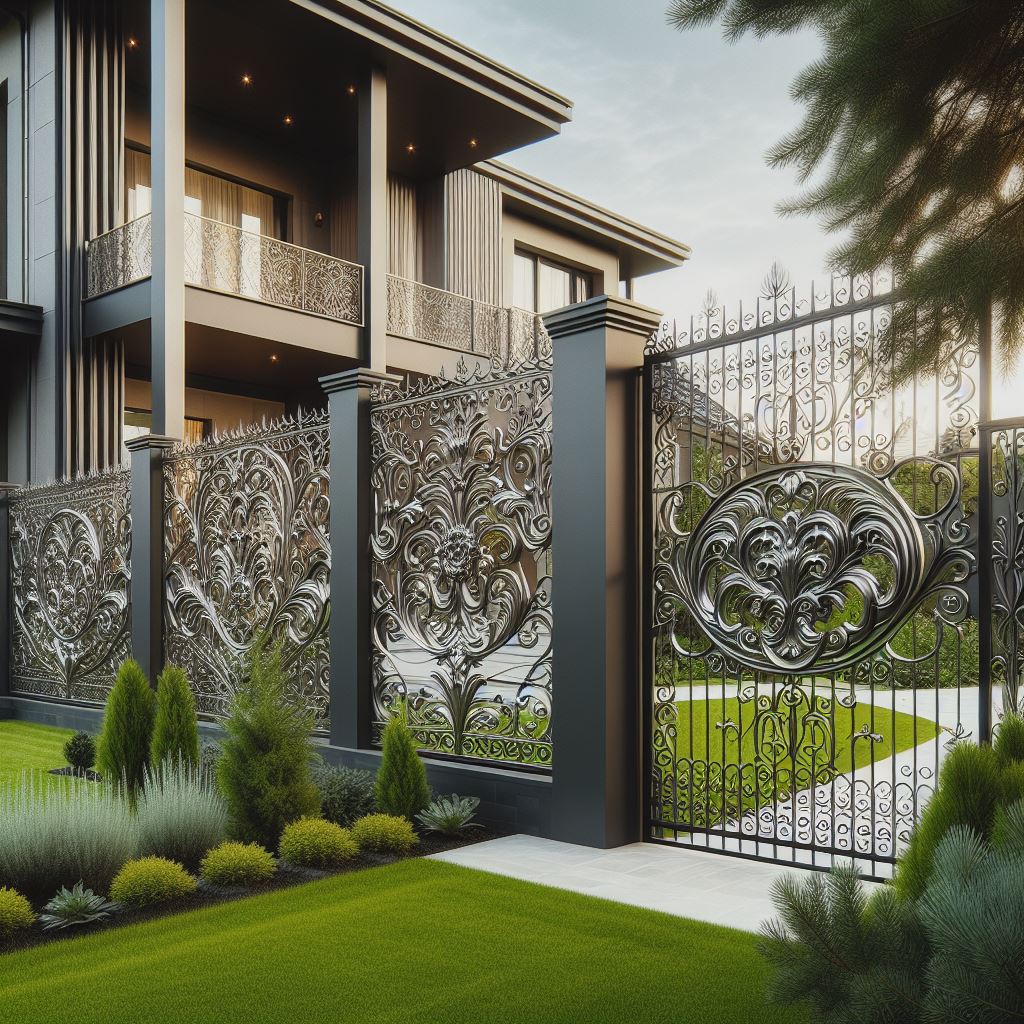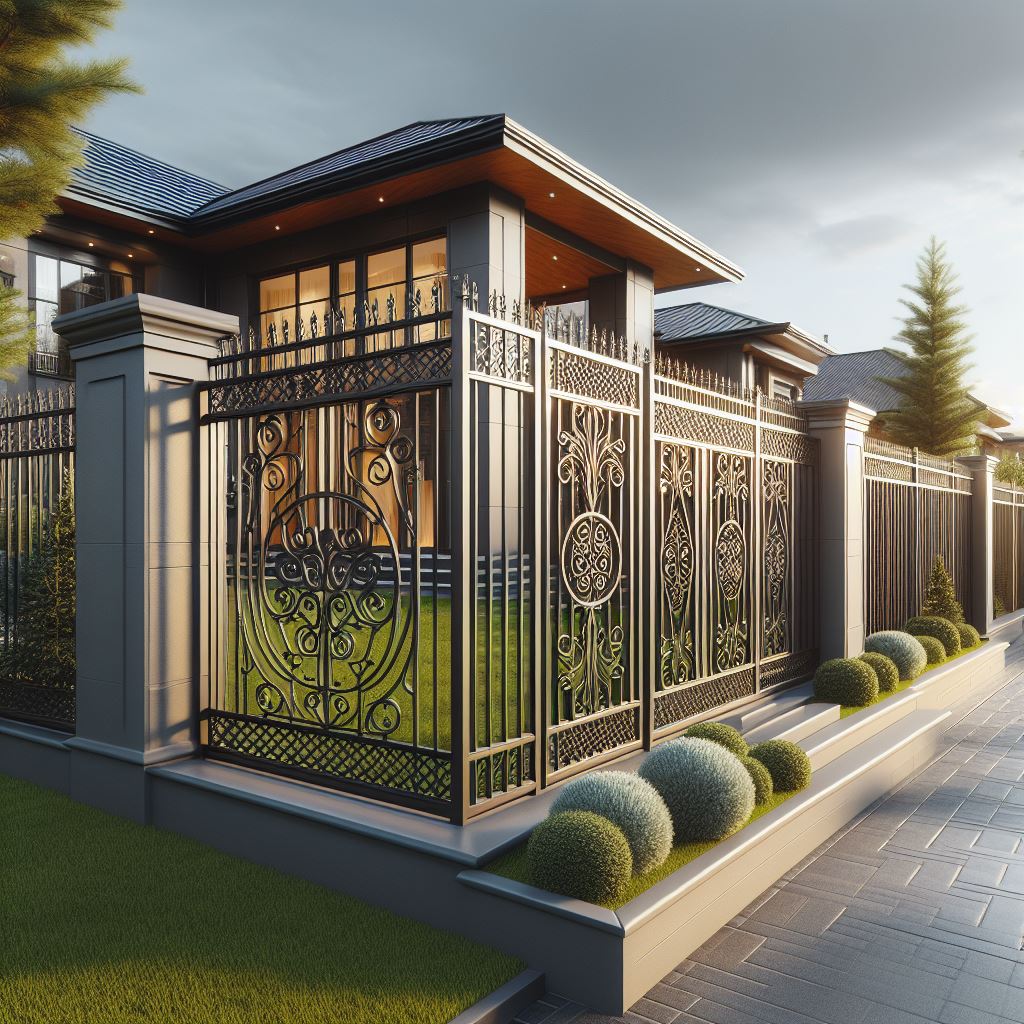When it comes to metal fences, they’re more than just lines demarcating your property. For DIY enthusiasts and self-employed contractors, these structures represent a fusion of functionality and aesthetics. Metal fences don’t just define boundaries; they enhance your home’s character while ensuring security and privacy.
Metal fences have evolved from mere property markers to symbols of style and security. They combine resilience with elegance, offering a practical solution for residential fencing needs.
A Quick History Lesson
Originally a luxury for the elite, metal fencing has become a staple in residential construction, accessible to all. This transition reflects not just a change in manufacturing techniques but also a shift in the perception of home security and aesthetics.

Metal Fences 101
What’s the Deal with Metal Fences?
Metal fences represent a blend of strength and style. They’re designed to withstand the elements while offering various customization options to reflect your personal style.
The Perks of Going Metal
- Durability: These fences endure harsh weather conditions, maintaining their integrity over time.
- Low Maintenance: They require minimal upkeep compared to wooden or plastic alternatives.
- Security: Robust and imposing, they provide a deterrent to intruders.
- Customization: With a range of designs and finishes, metal fences allow for personal expression.
The Many Faces of Metal Fences
Iron Fences
Iron fences are renowned for their strength and classic designs. They offer:
- Durability: With proper care, they last for decades.
- Designs: Available in a range of styles, from simple to ornate.
Aluminum Fences
Aluminum fences are a contemporary choice known for:
- Lightweight: Easy to handle and install.
- Rust-Resistant: Ideal for humid or coastal environments.
- Styles: Their sleek designs suit modern architectural trends.
Steel Fences
Steel fences are synonymous with strength and security, offering:
- Robustness: They are exceptionally durable and strong.
- Security Features: Ideal for areas requiring heightened security.
- Customization: They can be tailored to specific design preferences.
Wrought Iron Fences
Wrought iron fences are works of art, each with unique attributes:
- Artistry: Crafted with intricate designs and patterns.
- Historical Significance: Often associated with traditional and historic homes.
- Maintenance Tips: Regular care ensures longevity.
Chain Link Fences
Chain link fences are a practical and economical choice, offering:
- Affordability: Cost-effective for large areas.
- Functionality: Suitable for a variety of applications, from residential to commercial.
- Versatility: Easy to install and adapt to different terrains.
Metal Fences
When choosing a metal fence, consider the following:
- Cost: Budget constraints and long-term investment value.
- Durability: Lifespan and resistance to environmental factors.
- Maintenance: Time and effort required for upkeep.
- Aesthetics: The fence should complement the property’s architectural style.

Design and Aesthetic Considerations
When you’re picking out a metal fence, it’s like choosing the right tie for your suit – it needs to complement the whole package. This is about more than just function; it’s about enhancing your property’s aesthetic appeal.
Choosing the Right Design
- Fit Your Home’s Style: The design should be in harmony with your home’s architecture. A modern home might pair well with the clean lines of aluminum, while a traditional property can be beautifully framed by the ornate twists of wrought iron.
- Pattern Play: Consider the visual impact of the fence pattern. You want something that’s visually appealing without being overwhelming.
- Privacy vs. Openness: Decide how much you want to see and be seen. Full panels offer privacy, while spaced bars provide a more open view.
Color and Customization
- Color Choices: Black and grey are standard, but there’s a world of color out there. A green or brown can blend with the landscape, while bolder colors make a statement.
- Personalization: Custom elements like unique post caps or decorative panels can turn a standard fence into something special.
Matching Fence with Home Architecture
- Consistency Matters: Your fence should feel like an extension of your home, not an afterthought. A cottage-style house might be overwhelmed by a heavy, industrial-style fence, for example.
- Enhance, Don’t Overpower: The right fence should enhance your property’s best features, not overshadow them.

Installation and Maintenance
Installation Basics
- Accurate Measurements: This is crucial. An error here can lead to a lot of wasted time and materials.
- Solid Foundations: The posts are the backbone of your fence. Ensure they’re set deep enough to resist frost heave and provide stability.
- Consider Clearance: Leave enough space beneath the fence to prevent corrosion and ease maintenance.
Maintenance Tips
- Rust Management: Regular inspection and prompt treatment of any rust spots are key, especially for iron fences.
- Cleaning Routine: A gentle wash can keep most metal fences looking fresh. A mild detergent is usually sufficient.
- Regular Inspections: Tightening bolts and lubricating hinges are small tasks that can prevent bigger issues down the line.
Common Challenges
- Dealing with Slopes: Sloped terrains require careful planning. Racked or stepped panels can provide a solution that looks intentional and polished.
- Weather Considerations: In high wind areas, consider designs that allow wind to pass through to reduce strain on the fence.

Choosing the Right Metal Fence for Your Project
Factors to Consider
- Budget Constraints: Determine your budget upfront. Chain link is cost-effective, but wrought iron, while more expensive, offers unmatched elegance.
- Local Climate: In coastal or snowy regions, rust resistance will be a major factor in your choice.
- Style Compatibility: The fence should enhance, not clash with, your property’s aesthetic.
Sourcing Quality Materials and Contractors
- Invest in Quality: In fencing, like in most construction, you get what you pay for. Higher quality materials may cost more upfront but tend to offer better longevity and appearance.
- Choosing the Right Contractor: Look for contractors with experience in metal fence installation and check their references. The right installer can make all the difference in the final outcome.
FAQ Section
Properly maintained, a metal fence can last several decades – often 20-30 years, depending on the material and environmental conditions.
Generally, yes, but some materials are better suited to certain climates than others. For example, aluminum and coated metals are better for coastal areas.
Chain link fences are usually the most budget-friendly, while still offering durability and security.
Yes, metal fences offer great flexibility in design and can be tailored to fit a variety of property layouts.
Regular washing with a mild detergent and water is usually sufficient. Iron fences may require rust treatment and repainting every few years.
Metal fences are strong and durable, making them difficult to breach. They can also be designed with additional security features like spikes or pointed tops.
